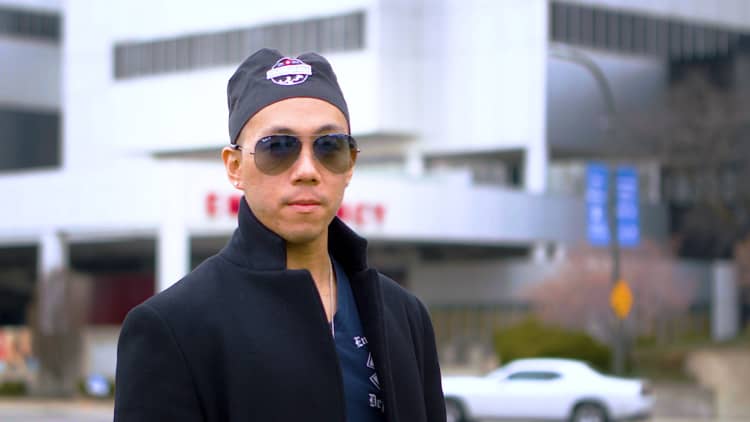Each time she takes the subway 45 minutes to work and back, New York City resident Regina Thompson is scared it's the day she'll finally contract Covid-19.
As a security officer at a university in Manhattan, Thompson relies on the train to commute to her job from her home in Floral Park, Queens. The fear doesn't end there: At the beginning of the pandemic, Thompson and her colleagues were working around students every day, and some of coworkers got sick.
"I've seen 9/11, I've seen blackouts, I've seen [Hurricane] Sandy, and now this," Thompson tells CNBC Make It. "I talk to a lot of my coworkers and everybody is scared."
On top of the daily stress of exposure, the 61-year-old spends her own money to buy protective gear for work, including face masks and disposable gloves, to supplement the single pair and mask she is given per shift by her employer. Her budget is stretched thin in other ways, too: Groceries, cleaning supplies and even doing laundry are all more expensive than they used to be in her neighborhood, and she is supporting two of her adult children who lost their jobs due to Covid-19.
The hardest part, though, is coming into work and not seeing the coworkers she's built bonds with over the past 20 years, she says. Many have been laid off, and Thompson worries that with no students on the grounds, she'll be next.
It's a very hard and scary situation now, the times we are living in. I've never seen anything like this.Regina ThompsonSecurity Officer
"It's a very hard and scary situation now, the times we are living in," she says. "I've never seen anything like this."
Hazard pay, defined by the Department of Labor as "additional pay for performing hazardous duty or work involving physical hardship," for essential workers during the pandemic would help, she says.
Though they are less visible than nurses, doctors and other health care professionals, cleaners, security officers and other service workers have also been risking their health to go to work throughout the pandemic, but with lower pay and less access to protective equipment.
Thompson is a member of the Service Employees International Union, which represents largely Black, Brown and immigrant work forces in the U.S. and Canada. SEIU is calling for the passage of the HEROES Act, the fourth piece of coronavirus stimulus legislation that was passed by the House and is currently stalled in the Senate.
The act includes a provision for a COVID-19 "Heroes Fund," through which the federal government would provide an additional $13 per hour, up to $25,000, to essential workers for their work through the end of the year, retroactive to January 27, 2020. The union is also calling for expanded sick pay and for high-quality gloves and masks to be provided.
"Essential workers should be compensated for the additional risk of infection they are taking by commuting to and being at work, as well as for the additional childcare and health care costs they are facing," reads a statement from SEIU.
For Mark Anthony Espinoza, a custodian at a New York City public school, the protective gear would be too little, too late to protect him from the virus. Both Espinoza and his wife contracted Covid-19 in March, and his father, who the couple lived with, and grandmother died from the disease. He hopes it would help his coworkers, though, and says hazard pay would ease some of the stress he's felt about keeping his job in the months to come.
Since he recovered, he's shown up for his shift every day. Still, he is worried that he'll be furloughed come fall, depending on whether students come back and if the school is fully funded. This uncertainty is taking a toll on the 35-year-old, especially since he and his wife are expecting their first child in December. Although they are trying to save money, he's worried his family will lose their health insurance before the baby is due.
"There's a lot of important medical stuff for when the baby is due, and that will start to rack up immediately," Espinoza tells CNBC Make It. "Especially a hospital bill, and then to lose the insurance? It's like, Congratulations, here's the bill."
Qualifying for hazard pay now would go a long way to help the family feel more secure, he says. He wishes the U.S. would be more proactive in fighting against the disease and helping workers, rather than reactive. Lip service from politicians is nice, he says, but hazard pay and other benefits included in the HEROES Act would actually make a difference in his life.
"I would like to see the clapping stop and the payments forwarded," he says, referring to the 7 p.m. clap for essential workers in New York City. "We're out here risking our lives."
Don't miss: There is a coming 'tsunami of evictions' because of coronavirus. Here's what could prevent it
Check out: The best credit cards of 2020 could earn you over $1,000 in 5 years



